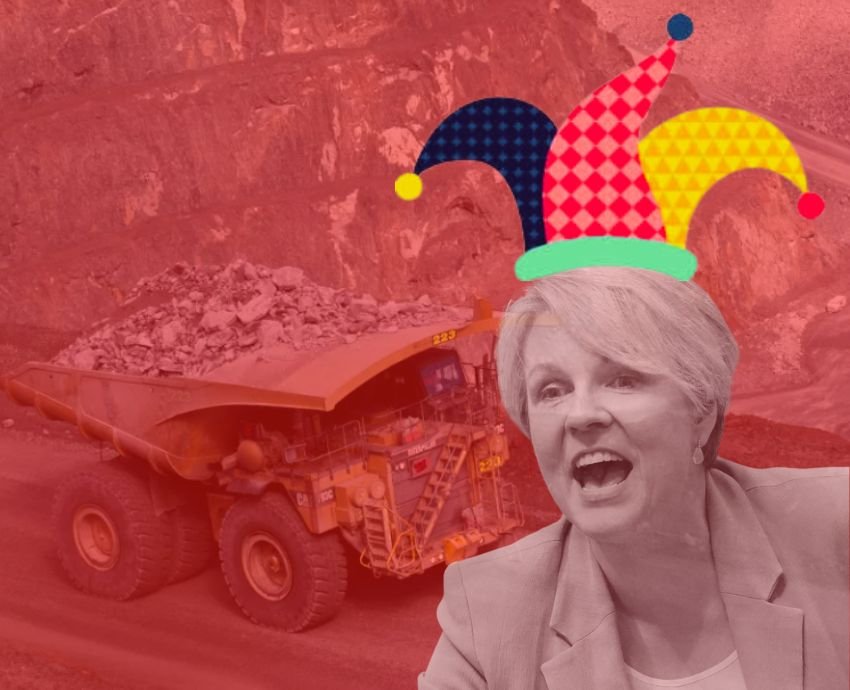
Mining magnates are the unelected captains of industry. While the official rhetoric might, seemingly, be at odds, especially when it comes to climate change, but if the country’s business is mining, governments will do whatever they can to accommodate mining CEOs’ wishes.
It is for that reason that environment minister Tanya Plibersek hovers between invisible non-entity and irritating court jester.
Her official role is to manage continuing mine approvals (and their extensions), while proclaiming Australia is on the march towards a decarbonised economy.
Plibersek slipped in a few more mining approvals just before the festive season, in the hope that few would notice.
It only makes sense by understanding that the environment minister tends to be the emissions’ protector in cabinet.
Anyone appointed to the role knows the prime minister thinks little of them. Last month, PM Anthony Albanese personally intervened to sink a deal that Plibersek had brokered with the Greens and independent Senator David Pocock to create a federal environment protection agency.
Plibersek said late last month that Australia had moved “from the margins of international environmental leadership — right to the front”, delivering and “helping nature thrive”. There are greater protections for biodiversity and native species. The Kunming-Montreal Global Biodiversity Framework had been agreed on.
Plibersek’s inner jester was again manifest on December 19, posting on X that Labor was “turning Australia into a renewable superpower”.
In another post, she said “What a difference a decade makes, mocking former Liberal Prime Minister Tony Abbott standing beside current Opposition Leader Peter Dutton in a 2014 shot with the following caption: “It’s 2014. These guys approved 8 new coal mines and were laughing about climate change.”
She fast forwards, saying: “In 2024, Labor has approved 0 new coal mines.”
This was a jest with little purchase. Plibersek approved three coal mine expansions in September, a move she suggested could not be regarded as “new projects”.
These decisions, she justified, had been made “in accordance with the facts and the national environment law”.
The Australian Conservation Foundation reminded her that the three projects, all based in New South Wales, would generate more than 1.3 billion tonnes of greenhouse gas emissions in the course of their operation.
These extensions, it is also worth considering, are not recommended by the International Energy Agency (IEA) if global warming is to be limited to the magic figure of 1.5°C.
In its 2021 report, the IEA envisages a “Net-Zero Emissions Scenario (NZE) by 2050”, in which fossil fuel use will fall “drastically”. There would be no need either for new oil and natural gas fields beyond current approvals, or new coal mines or mine extensions.
What made matters worse was that December 19 was the day on which three mining projects were approved: Caval Ridge Horse Pit Extension at the Bowen Basin in Queensland; Lake Vermont Meadowbrook Coal Mine Project, also in Queensland; and the New South Wales Boggabri Coal Mine was given a State Significant Development status.
Progressive think thank The Australia Institute started a petition titled “We need to stop new fossil fuels”.
“While our leaders claim that Australia is on track to meet its climate targets of 43% emissions reduction by 2030, and net zero by 2050, Australia Institute research shows that when land sector emissions are removed from the modelling, Australia’s emissions are actually increasing.”
TAI pointed out that the three mines, in their current state of operation, “were already so large that they could almost cover greater Sydney, or most Australian cities”.
Research director Rod Campbell said: “Putting this out just before Christmas is a classic ‘taking out the trash’ tactic. While Australians are trying to enjoy the end of the year, the Minister is doing the bidding of multinational coal companies.”
The Climate Council also condemned the decision. Lesley Hughes said: “Our atmosphere doesn’t care if this coal is for steel or power — it’s all heating our planet and driving climate pollution.
“Burning coal fuels the climate crisis, worsening bushfires, floods and heat waves that devastate our communities. This decision flies in the face of science, common sense, global responsibility and our duty to protect our kids’ future.”
Plibersek is unlikely to be ignorant of all this. But Labor policy is conducted within a cage of constraint. When so confined, the options narrow: to vanish or become a jester. She has become the latter.
[Binoy Kampmark lectures at RMIT University.]